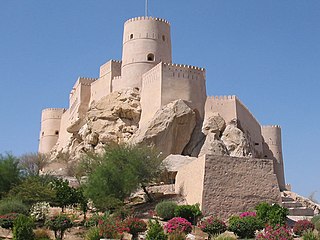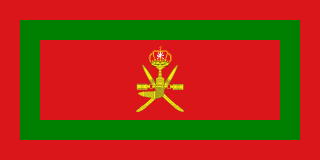Related Research Articles

Oman is the site of pre-historic human habitation, stretching back over 100,000 years. The region was impacted by powerful invaders, including other Arab tribes, Portugal and Britain. Oman once possessed the island of Zanzibar on the east coast of Africa as a colony. Oman also held Gwadar as a colony for many years.

Turki or Torki bin Said al Busaidi, GCSI was Sultan of Muscat and Oman from 30 January 1871 to 4 June 1888. He was the fifth son of Said bin Sultan. He acceded following his victory over his rival the Imam Azzan bin Qais at the Battle of Dhank. On Turki's death, he was succeeded by his second son, Faisal bin Turki.

Sayyid Saïd bin Sultan al-Busaidi was Sultan of Muscat and Oman, the fifth ruler of the Busaid dynasty from 1804 to 4 June 1856. His rule began after a period of conflict and internecine rivalry of succession that followed the death of his father, Sultan bin Ahmad, in November 1804. He is often referred to as the Lion of Oman, as one of the greatest Omani sultans.

Imruʾ al-Qais Junduh bin Hujr al-Kindi was a pre-Islamic Arabian poet from najd in the late fifth and early sixth centuries and also the last King of Kinda. He is sometimes considered the father of Arabic poetry. His qaṣīda, or long poem, "Let us stop and weep" is one of the seven Mu'allaqat, poems prized as the best examples of pre-Islamic Arabian verse. Imru' al-Qais was born in the Al-Qassim Region of northern Arabia sometime in the early 6th century. His father was said to be Hujr bin al-Harith, the Kindan regent over the Arab tribes of Asad and Ghatafan, and it is believed that Imru' al-Qais was born in the territory of Asad. His mother was said to be Fatimah bint Rabi'ah al-Taghlibi.

The House of Busaid, also known as Al Said dynasty, is the current ruling royal house of the Oman, and former ruling royal house of the Omani Empire (1744–1856), Sultanate of Muscat and Oman (1856–1970) and the Sultanate of Zanzibar (1856–1964). It was founded by Ahmad bin Said al-Busaidi, ruler of Oman and its east African territories at the time.

Qais bin ʿAbdul-Munʿim Az-Zawāwī was the second foreign minister for the Sultanate of Oman, and later from 1982 served as Deputy Prime Minister for Economic and Financial affairs until his tragic death on 11 September 1995, in the Salalah accident, whilst in the car with His Majesty Sultan Qaboos bin Said, and his brother Dr Omar bin Abdul-Mun'im Al-Zawawi, the external liaison for the Sultan.
Sharakah is a closed-joint stock company incorporated by a Royal Decree in the Sultanate of Oman in 1998. Sharakah provides financial support and post0financial to Small and Medium Enterprises (SMEs) in the Sultanate of Oman.

The Ministry of Interior is the governmental body in the Sultanate of Oman responsible for supervising administrative issues in the various Wilayat of the country, dealing with tribal issues, and overseeing the election process of the Shura Council.

Hajj Moosa AbdulRahman Hassan was an Omani businessman, tribal leader, and landlord. He was born in the old town of Muscat and finished his studies in the American Mission School. He established a firm in 1927 in supplying coals and foodstuffs to British ships & frigates in Muscat.
Badr or Badar bin Saif was a member of the Al Said dynasty of Oman. In 1804 he became regent while the heirs to the sultanate were minors. When he attempted to increase his power in 1806 he was killed.

The Omani Empire was a maritime empire, vying with Portugal and Britain for trade and influence in the Persian Gulf and Indian Ocean. After rising as a regional player in the 18th century, the empire at its peak in the 19th century saw its influence or control extend across the Strait of Hormuz to modern-day Iran and Pakistan, and as far south as Cape Delgado. After the death of Said bin Sultan in 1856 the empire was divided between his sons into two sultanates, an African section ruled by Majid bin Said and an Asian section ruled by Thuwaini bin Said.
Said bin Ahmad was briefly the Imam and Sultan of Oman, the second of the Al Said dynasty, ruling the country between 1783 and 1786.
Hamad bin Said was ruler of Oman, the third of the Al Said dynasty, ruling the country between 1786 and 1792.
Sultan bin Ahmad al Busaidi was the Sultan of Oman, the fourth of the Busaid dynasty, ruling the country between 1792 and 1804.
Salim bin Sultan was joint Sultan of Oman with his brother Said bin Sultan, ruling between 1804 and 1806.
Qais bin Ahmad was the third son of Ahmad bin Sa'id Al-Busaidi, the first Sultan of Oman of the Al Said dynasty. After his father's death he made more than one attempt to gain the throne.

Haitham bin Tariq Al Said is Sultan and Prime Minister of Oman.
Qais is an Arabic given name meaning lover or firm. 'Qays', 'Qaiss and 'Qai' are alternatives of Qais.
Oman Cricket Academy Ground, also known as the Al Amerat Cricket Stadium, is a cricket ground in Al Amarat, south of Muscat, Oman. The ground is owned by the Oman Cricket Board. In January 2021, the International Cricket Council (ICC) gave accreditation for the Ministry Turf 1 at the stadium to host Test cricket.

The Battle of Dhank took place in October 1870, ranging forces in support of the Omani Imam Azzan bin Qais against Turki bin Said, Sultan of Muscat. The battle was won by Turki bin Said backed by forces from Dubai, Ajman and Ras Al Khaimah as well as mounted fighters from the Na'im and Bani Qitab tribes.